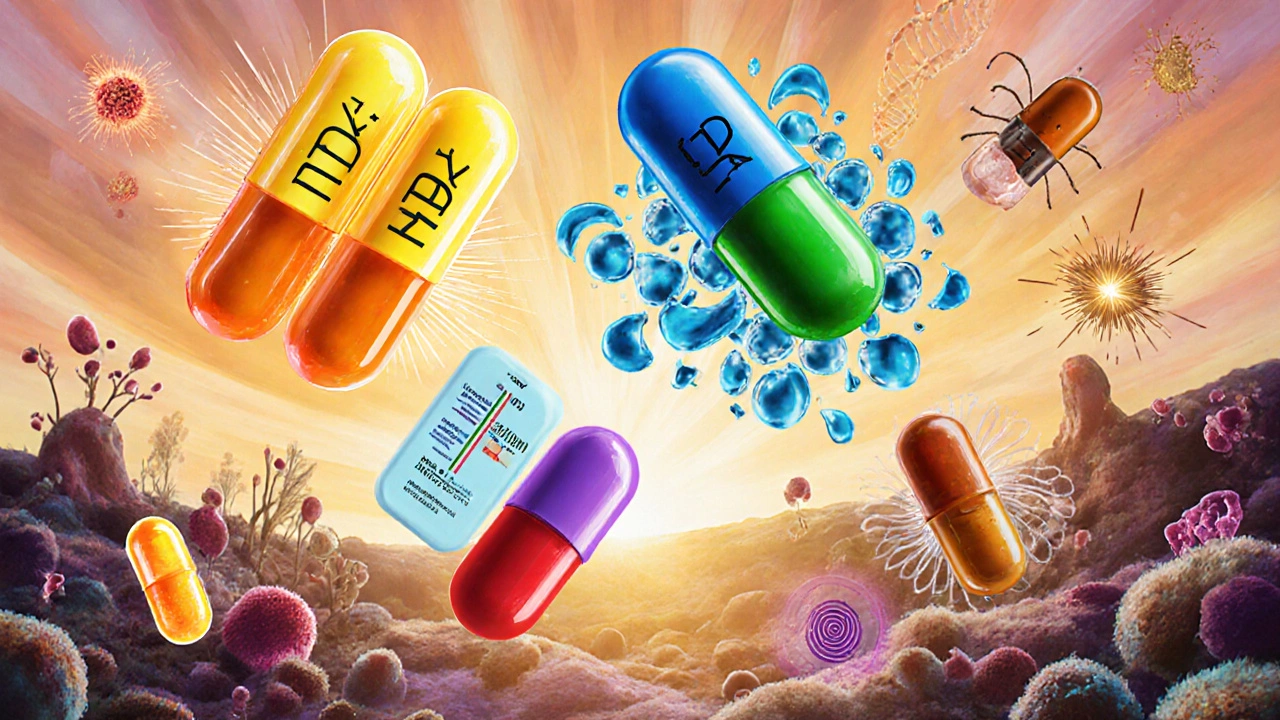Top Anti‑Aging Drugs: Is There a Miracle Cure for Aging?
 Oct, 15 2025
Oct, 15 2025
Anti-Aging Drug Recommendation Tool
Personalized Anti-Aging Compound Recommendation
Answer a few questions to get a personalized recommendation for anti-aging compounds based on your health profile and goals.
Your Personalized Recommendation
Important Considerations
How to Start Safely
- Consult a healthcare professional Required
- Start at the lowest recommended dose Important
- Monitor blood work every 3-6 months Recommended
- Track your progress in a log Recommended
When scientists talk about a anti‑aging drug is a substance that targets biological pathways linked to age‑related decline, aiming to extend healthspan and sometimes lifespan, the idea of a miracle cure instantly pops up. In reality, there are several promising compounds, each with its own mechanism and evidence base. Below you’ll find a plain‑English rundown of the most talked‑about candidates, what the data say, and how you might weigh them against your own health goals.
Key Takeaways
- There is no single "miracle" pill yet; the best approach combines lifestyle with evidence‑backed compounds.
- NMN and nicotinamide riboside boost NAD+ levels, supporting cellular repair.
- Metformin and rapamycin act on metabolic and growth pathways that influence longevity in animals.
- Senolytics such as dasatinib+quercetin clear damaged cells, showing early human benefits for frailty.
- Safety profiles vary; most drugs need medical supervision before regular use.
Why Target Aging with Drugs?
Aging isn’t just a calendar; it’s a cascade of molecular events-DNA damage, inflammation, loss of mitochondrial function, and accumulation of senescent cells. Researchers label these processes "hallmarks of aging." By intervening at the biochemical level, a drug can theoretically slow down or reverse some of these hallmarks, leading to fewer chronic diseases and better quality of life.
Leading Anti‑Aging Compounds
Below are the six compounds that dominate current research. Each paragraph introduces the molecule with a micro‑data tag, explains its main target, and highlights the strongest human evidence.
NMN (Nicotinamide mononucleotide) is a direct precursor to NAD+, the co‑enzyme that fuels DNA repair and mitochondrial health. Raising NAD+ levels in mice revives youthful metabolism, and early‑phase human trials show improved insulin sensitivity and muscle endurance after 10‑week supplementation.
NR (Nicotinamide riboside) works similarly to NMN, converting to NAD+ via a slightly different enzymatic route. Large‑scale safety studies in healthy adults report no serious adverse events, and a 12‑month trial linked NR to better vascular function.
Metformin is a first‑line diabetes drug that lowers hepatic glucose production and improves insulin sensitivity. In animal models, metformin extends median lifespan by 15‑30%. The ongoing TAME (Targeting Aging with Metformin) trial aims to see if it can delay age‑related chronic diseases in people without diabetes.
Rapamycin (also called sirolimus) inhibits the mTOR pathway, a central regulator of cell growth and protein synthesis. Short‑term rapamycin treatment in mice consistently adds weeks to lifespan and improves immune function. Small human pilot studies suggest it can boost vaccine responses in older adults, but side‑effects like mouth ulcers limit long‑term use.
Senolytics are a class of drugs that selectively eliminate senescent cells, which secrete inflammatory factors. The most studied cocktail combines dasatinib-a leukemia medication-with quercetin, a plant flavonoid. In a 12‑week trial with older adults, the combo reduced physical frailty scores and circulating inflammatory markers.
Fisetin is a natural flavonoid found in strawberries and apples. It acts as a senolytic in animal studies and has been shown to improve cognitive function in aged mice. Human data are still sparse, but a 2023 phase‑2 trial reported modest reductions in blood‑based senescence markers.
Spermidine is a polyamine that promotes autophagy, the cellular cleanup process that declines with age. Epidemiological data link higher dietary spermidine intake with lower cardiovascular mortality. Supplement trials show improved memory performance after 3months.

Side‑Effect Snapshot
Even “miracle” compounds can have downsides. NMN and NR are generally well tolerated, though occasional nausea has been reported. Metformin’s most common issue is mild gastrointestinal upset, and rare cases of lactic acidosis in people with kidney disease. Rapamycin can cause dyslipidemia and mouth sores. Dasatinib carries a risk of low blood counts, while quercetin may interact with anticoagulants. Fisetin and spermidine have low adverse‑event rates but long‑term safety isn’t fully established.
How to Choose a Candidate
Think of the decision as a checklist. Ask yourself:
- Do you have any chronic conditions (e.g., diabetes, kidney disease) that would contraindicate a drug?
- Are you comfortable with prescription‑only meds (dasatinib, rapamycin) versus over‑the‑counter supplements (NMN, NR, spermidine)?
- What’s your primary goal-metabolic health, immune support, or cellular cleanup?
- How much clinical evidence do you need before you start?
Most people start with NAD+ boosters (NMN or NR) because they’re easy to buy, have a clean safety record, and address a root cause (declining NAD+). If you have a doctor’s green light and want a more aggressive approach, metformin or a low‑dose senolytic regimen may be next steps.
Comparison of Leading Anti‑Aging Drugs
| Drug | Primary Target | Evidence Level | Typical Dosage | Main Risks |
|---|---|---|---|---|
| NMN | Boost NAD+ | Human Phase1/2 (positive metabolic outcomes) | 250-500mg daily | Rare nausea, cost |
| Metformin | AMPK activation, insulin sensitizer | Large epidemiology, TAME trial pending | 500-2000mg daily | GI upset, rare lactic acidosis |
| Rapamycin | mTOR inhibition | Animal lifespan extension, small human pilots | 1-2mg weekly (intermittent) | Mouth ulcers, lipid changes |
| Dasatinib+Quercetin | Senescent cell clearance | Human frailty trial (phase2) | 100mg dasatinib + 1000mg quercetin (3days/month) | Blood‑count drops, drug interactions |
| Fisetin | Senolytic, anti‑oxidant | Animal models, early human phase2 | 100-200mg daily | Generally safe, unknown long‑term |

Practical Tips for Starting a Regimen
- Consult a healthcare professional before mixing prescription drugs with supplements.
- Begin with the lowest recommended dose and monitor blood work every 3‑6months.
- Pair any drug with proven lifestyle pillars-regular exercise, adequate sleep, and a diet rich in polyphenols.
- Keep a simple log: date, dose, any side effects, and how you feel. Patterns emerge quickly.
Future Directions
Researchers are now targeting the “epigenetic clock” with DNA‑methylation modulators, and gene‑editing tools like CRISPR‑Cas9 are being explored for senescent‑cell clearance. Combination therapies-pairing NAD+ boosters with senolytics-are entering phase‑2 trials, hinting that the future may involve a tailored cocktail rather than a single miracle pill.
Frequently Asked Questions
Can I take NMN and metformin together?
There’s no known harmful interaction, but both affect metabolism. Start at low doses, monitor blood sugar, and discuss with a clinician to avoid over‑suppression of glucose.
How long does it take to see benefits from a senolytic regimen?
Clinical trials report measurable improvements in physical performance and inflammatory markers after 8-12weeks of intermittent dosing.
Is rapamycin safe for everyday use?
Most studies use low‑dose, intermittent schedules (e.g., once a week) to minimize side‑effects. Long‑term daily use is not recommended without specialist supervision.
Do lifestyle changes matter if I’m taking an anti‑aging drug?
Absolutely. Drugs amplify the body’s capacity to repair, but without good sleep, diet, and exercise the benefits are limited.
What’s the most affordable anti‑aging supplement?
NMN and NR have dropped in price to around $30‑$50 for a 30‑day supply, making them the cheapest options with solid human data.
